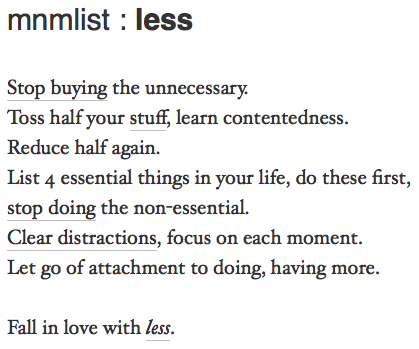Voluntary Simplicity/Downshifting
That sums it up pretty well haha, but I’ll write a little more so that I’ve accomplished more than just finding a picture. ![]()
Voluntary Simplicity
From what I gather, it’s the overall ideals of living a simple life. Finding happiness and fulfillment in activities that have little to no monetary value. It is a re-evaluation of life which oftentimes goes against the materialism and consumer culture of today’s world. However, voluntary simplicity does not mean you need to live in poverty. Yes, being frugal often helps, but the goal is not to save money; it is to strike a balance in life.
Be frugal, but not cheap. Spend on what matters and just…be happy.
This might entail redefining many key points in your life.
Example = money
Money was created as a tool for exchange. It really has no value except for trading purposes. You can get goods from other sources than money; personal efforts and exchanges [reciprocity] have worked for people long before money was invented. But, you obviously can’t just get rid of money. Instead, think of the saying “Time is Money.” You have to spend so much time at work to make money. You invest so much of your life into it, why not spend wisely? When you have a tough day at work, you might want to splurge; retail therapy, anyone? But spending that much means you have to invest more time at work to pay for it.
Just take a look at your consumption. What are your basic vs. work/school related needs and WHY do you consume-is it in line with your values? A lot of spending may be connected to emotions; sense of belonging, self-esteem, community, etc. By looking at what you spend, you might find benefits of nonmaterial consumption and, in turn, not fall into the trap of conspicuous consumption. [Conspicuous consumption is the buying of goods to show wealth; think of one-upmanship and status conferred by possessions.]
By having some insight, you will start to change how you live and may downshift your life, but upshift your happiness.
